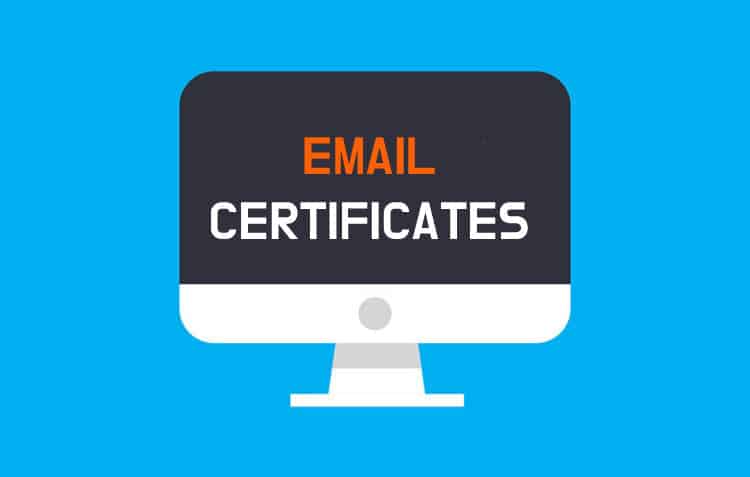To help prevent the leaking of any information from the emails, they’re converted into undecipherable text, generally called cipher text with the help of certain keys, during the transmission from the sender to the receiver. Indeed if you work for the organization or not we all are apprehensive about the fact that companies or enterprises partake a lot of data between the members of the company and also among different organizations, so dispatch encryption becomes a prerequisite.
Therefore, translated data can only be deciphered after the recipient receives the email. And email certificates play a role in providing the information that the email has not been changed even a bit during its transmission.
Emails are passed around a number of servers, while this process they are not secure, so alternative protecting methods are used to maintain its authenticity. Email certificates act as proof of security and thus help in the process of email encrypting.
What are Email Certificates?
Email certificates are digital certificates that as the proof of identification during the email encryption process. They are installed in your system in order to provide security during the email exchange. During the transmission process, these certificates provide your identity to the recipient along with the encoded data of the email. They are also known as S/MIME Certificate (Secure/Multipurpose Internet Mail Extension). These certificates are digitally signed by Certificate Authorities, that act as the third party witness.
How does Email Certificate work?
It works on the PKI principle. PKI stands for Public Key Infrastructure, this infrastructure is not only limited to SSL/TLS Certificates but also works in Email Certificates. PKI basically allows the user to authenticate its data, with its Digital signatures and then send it to the recipient. Similarly, Email certificates being one of the components of Public Key Infrastructure, provide the same service to its users. The whole contents of the Email are secured in a certain order and then are sent out to reach the recipient’s server.
You need to have a particular email client to send your email from and when you send your encrypted email, the recipient’s email client downloads your email certificate verifies it and adds in its address for further communication. Hence, Email certificates are important for protecting your email from Traducers.
Why email certificates are important?
Without Email certificates, your emails are open to being scanned by any traducer or the accustomed server that usually passes on your email. This could be accessed by plenty of masses or traducers online. It’s like sending chits to your friend in the class, but it is open to be read by every single person who passes it on till it reaches your friend. With the Email Certificates, you are 100 percent certain that the contents in your email are secure, till it reaches the designated address.
Sometimes, people confuse the S/MIME certificate with the ‘Server authentication SSL Certificate’. Server authentication SSL Certificate is only responsible for securing all the transmitted emails from the server to your native computer, but as soon as the email is transmitted to some other server, the authentication provided to the email ends there and is available to be scanned by the number of servers. But S/MIME Certificate provides you end-to-end encryption, that is the contents of the email are safe between different email servers too.
How to Buy an Email Certificate?
To buy an email Certificate you need to find a legitimate Independent Certificate Authority. Obtaining an Email Certificate is an extremely simple process.
Step 1: Register with a certain Certificate authority.
Step 2: Send your Proof of Email address for verification.
Step 3: You will receive an email back from the Certificate Authority. You will need to respond to that.
Step 4: Download the Certificate on your desired Email client, which will be sent to you after your response.
There is a number of Certificate Authorities that could provide you the email Certificates like GoDaddy, DigiCert, Sectigo, CACert, etc. Also, Email clients are those that are available to easily support the email certificates, a few of them are Microsoft Outlook, Apple Mail.app, Netscape Messenger, Mozilla Thunderbird, Outlook Express.
Conclusion
Everything has its pros and cones, so lastly few disadvantages that we come across while using the email certificates are, for the end-to-end Encryption we need a private key, and sometimes what happens is, that user might lose that private key of the email certificate, and then the are message is not decrypted and it becomes kind of the mess to decrypt the certain message.
Secondly, due to the increase in cybercrimes, it becomes quite possible for the traducers to send the virus to the email without the knowledge of the company. Lastly, it is possible that your recipient’s email client don not support S/MIME or email certificate and thus the users could be baffled by the ‘smime.p7s’ attachments on their email.


